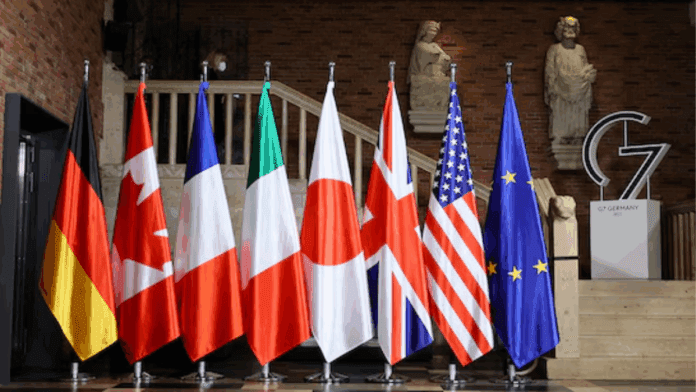In a powerful statement made in June 2025, the Group of Seven (G7) nations have agreed to explore the use of sanctions against people involved in migrant smuggling and human trafficking.
G7 Endorses Sanctions to Fight Trafficking
This decision was made public after the G7 summit in Kananaskis, Canada. In their official note, leaders said they would look into using legal tools like sanctions to go after criminals running trafficking operations from various countries.
This marks a major shift in how global powers are dealing with one of the world’s most troubling crimes. Human trafficking and migrant smuggling often go hand in hand, hurting millions of people across borders. While many countries have laws against these crimes, the G7’s move to use sanctions adds a powerful new layer of pressure.
Sanctions are restrictions placed on people or organizations. They can block access to money, freeze bank accounts, and prevent travel. Until now, these tools were mostly used against corrupt leaders, drug traffickers, or cybercriminals. Now, they may be used more often against those who profit from moving and abusing vulnerable people.
Few Sanctions So Far, But Impact is Growing
While this decision is fresh, some countries have already started using such sanctions. The United States has used them against people involved in smuggling and trafficking in countries like Mexico, Pakistan, and Myanmar. The United Kingdom has applied similar measures against traffickers in Southeast Asia. The United Nations has done so in places like Libya and Mali, where smuggling and trafficking have caused extreme harm.
Even though the number of sanctions is still low, early signs show they can make a difference. In Libya, for example, sanctions have helped reduce some of the worst forms of migrant abuse. Criminal networks there have started to change how they operate. This shift shows that targeting key figures might help stop the worst kinds of smuggling.
Experts say that stopping these crimes completely may not be possible. But sanctions can disrupt the criminal systems behind them. These systems are not run by one person or group. They include local gangs, corrupt officials, shady businesses, and even people who help in small ways without knowing the full damage. By targeting the entire network, sanctions can change how criminals think and operate.
Sanctions Must Be Part of a Bigger Strategy
Even though sanctions are a strong tool, experts warn they cannot work alone. They must be part of a bigger plan. This plan should include other efforts like police work, court cases, support for local law enforcement, and development help for poor areas at risk of crime.
End of the Free Package Era? G7 Moves to Shut Down China’s Zero-Tariff Exports
Also, once a sanction is in place, it must be tracked. These actions should not be used just once and forgotten. Governments need to watch how the crime networks change and adjust their response as needed. This means checking the impact of sanctions regularly and sharing the findings with other countries to improve teamwork.
One of the biggest challenges is that people expect quick wins. But when it comes to human trafficking and migrant smuggling, there is no single solution. Sanctions are not meant to end these crimes overnight. They are long-term tools that can slowly reduce the harm these crimes cause.
It’s also important to understand who is involved. It’s not just criminals moving people across borders. There are many others who help in quiet or hidden ways, including people in business or government. For sanctions to work, they must target the full web of people and organizations behind the scenes.
In summary, the G7’s latest move shows how seriously global leaders are taking this issue. It’s a sign that more action is coming. While the road ahead is long, using sanctions as one tool in a wider fight could bring meaningful change. As more countries join in, the pressure on traffickers and smugglers is likely to grow.
